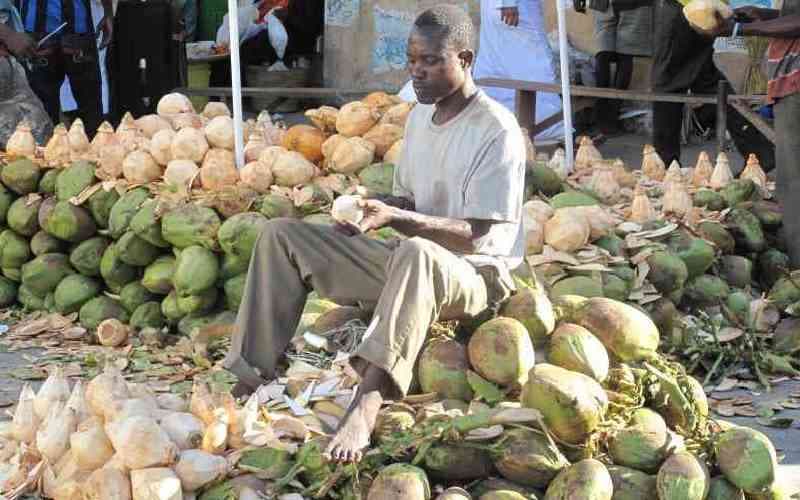We're loading the full news article for you. This includes the article content, images, author information, and related articles.
A Kwale-based entrepreneur is demonstrating the vast economic potential of coconuts, transforming the versatile fruit into a range of high-demand products and creating employment opportunities in a region grappling with unemployment.

In Mwabuga village, Kwale County, Mr. Hamisi Mwakumanya, 60, has successfully built a thriving business by transforming coconuts into a diverse array of products, including virgin oil, herbal lotions, shampoos, eco-charcoal, and fibre mats. His enterprise, which began with humble experiments in his backyard, now supplies customers across Kenya and parts of East Africa, employing at least 10 local youth and women.
Mwakumanya's journey into agribusiness began in the early 2000s as he approached retirement, driven by a desire to remain productive. He received training from Jomo Kenyatta University of Agriculture and Technology (JKUAT), which he credits with opening his eyes to the coconut's potential beyond just a fruit.
Coconut farming has deep roots in Kenya's coastal region, particularly in Kwale, Kilifi, Mombasa, Lamu, Tana River, and Taita-Taveta counties, where over 95% of the country's approximately 10 million coconut trees are concentrated. The crop is often referred to as the "tree of life" due to its extensive uses, providing food, beverages, oil, fibre, and timber.
Despite its significance, the coconut sub-sector has historically faced challenges, including low productivity from aging trees, poor agronomic practices, and exploitation by middlemen. The Nuts and Oil Crops Directorate (NOCD) estimates that while the coconut sector has a potential to generate KES 13 billion annually, only about KES 3.2 billion is currently exploited.
Both national and county governments have recognised the need to revitalise the coconut industry. The Kwale County government, for instance, has embarked on an aggressive expansion programme, distributing hybrid coconut tree seedlings to farmers. In April 2025, Governor Fatuma Achani launched the distribution of 5,000 hybrid coconut seedlings across nine wards, aiming to boost production and diversify incomes. This initiative is part of broader efforts to promote agricultural sustainability and economic empowerment.
The Kenya Bureau of Standards (KEBS) certification has also played a crucial role in enabling businesses like Mwakumanya's to access wider markets and build consumer trust. Such certifications are vital for local products to compete effectively in national and international markets.
Mr. Mwakumanya's success story is a testament to the potential of value addition in the coconut sector. His workshop not only provides employment but also serves as a model for other aspiring entrepreneurs. He actively mentors farmers and speaks at agricultural expos, advocating for the sharing of knowledge to empower young people and demonstrate that nature provides resources for economic growth.
However, farmers continue to face challenges. In May 2024, coconut farmers in Mtsungani, Kwale County, resolved to form associations to combat exploitation by middlemen who often buy coconuts at low prices (e.g., KES 10 per nut) and sell them at significantly higher rates (KES 30-70). Farmers have called on the county government to establish processing plants and implement empowerment programmes to educate them on value addition.
Despite the opportunities, the coconut sector faces risks such as inconsistent supply, especially during dry seasons, and the high cost of quality packaging, which limits bulk production for high-end markets. Climate variability, including drought, also poses a significant threat to coconut production. The continued felling of coconut trees for timber and other uses further exacerbates the decline in production.
While the potential of the coconut sector is widely acknowledged, the full extent of its economic contribution remains largely untapped. The lack of adequate research, poor agronomical practices, and limited access to appropriate technologies continue to hinder growth. The issue of fair pricing for farmers and the dominance of middlemen also remain contentious points within the value chain.
The Kwale County government's ongoing distribution of hybrid seedlings, as seen in April 2025, signifies a commitment to long-term sector growth. Efforts to educate farmers on value addition and sustainable practices are crucial next steps. Organisations like Kentaste Limited, a Kwale-based coconut processor, are expanding their exports, creating more opportunities for local farmers through partnerships.
Watch for further initiatives from county governments and agricultural bodies to support value addition and address market inefficiencies. The development of farmer cooperatives and associations will be key in empowering farmers and ensuring fair returns. Additionally, the adoption of high-yielding, disease-resistant hybrid coconut varieties will be critical for increasing overall productivity.
Keep the conversation in one place—threads here stay linked to the story and in the forums.
Sign in to start a discussion
Start a conversation about this story and keep it linked here.
Other hot threads
E-sports and Gaming Community in Kenya
Active 9 months ago
The Role of Technology in Modern Agriculture (AgriTech)
Active 9 months ago
Popular Recreational Activities Across Counties
Active 9 months ago
Investing in Youth Sports Development Programs
Active 9 months ago
Key figures and persons of interest featured in this article